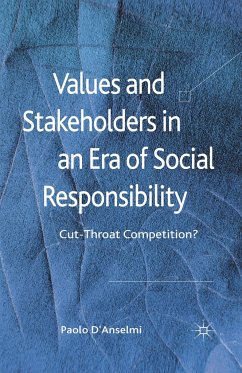'In this original contribution the author forcefully argues that competition creates value and that SMEs have as yet not realized
their potential to enhance competitive forces to possibly be the most vital player in the value chain.' Pulin Nayak, Delhi School of Economics, India
'Finally a self-interest approach to responsibility whereby virtue is no longer its own reward. Both East and West will appreciate
this paradigm that applies in the private as well as the public sector.' Hou Shengtian, School of Management, Beijing University of Chinese Medicine, China
'In this striking new book, Paolo D'Anselmi provides an entirely novel and refreshing look at the basic ideas of Corporate Social
Responsibility an area that is desperately in need of a new perspective. Broadening the concept, he takes the view that all
organizations should be accountable for their social responsibility and then inquires about how this new social accountability can
best be constructed for different kinds of organizations. Introducing the concept of 'competition' both within and across industries and sectors he argues thoughtfully and provocatively that the best way forward is to use the knife of competition to hone the social performance of all organizations. This book provides the most searching reformulation of how to think about CSR to appear in decades.' Herman B. 'Dutch' Leonard, Harvard University, USA
their potential to enhance competitive forces to possibly be the most vital player in the value chain.' Pulin Nayak, Delhi School of Economics, India
'Finally a self-interest approach to responsibility whereby virtue is no longer its own reward. Both East and West will appreciate
this paradigm that applies in the private as well as the public sector.' Hou Shengtian, School of Management, Beijing University of Chinese Medicine, China
'In this striking new book, Paolo D'Anselmi provides an entirely novel and refreshing look at the basic ideas of Corporate Social
Responsibility an area that is desperately in need of a new perspective. Broadening the concept, he takes the view that all
organizations should be accountable for their social responsibility and then inquires about how this new social accountability can
best be constructed for different kinds of organizations. Introducing the concept of 'competition' both within and across industries and sectors he argues thoughtfully and provocatively that the best way forward is to use the knife of competition to hone the social performance of all organizations. This book provides the most searching reformulation of how to think about CSR to appear in decades.' Herman B. 'Dutch' Leonard, Harvard University, USA








